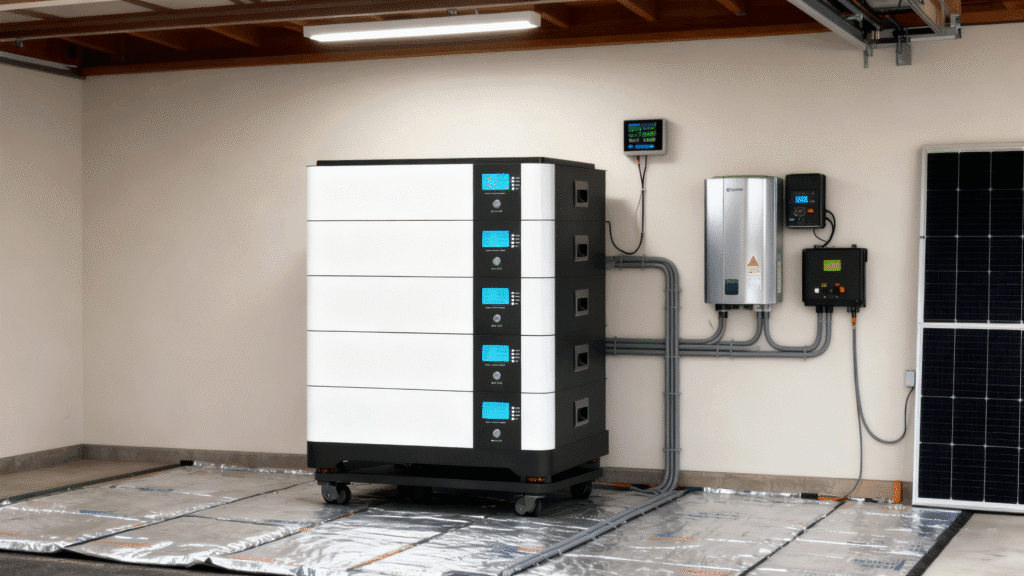A solar battery is an essential component for anyone looking to maximize the efficiency of their solar energy system. By storing excess electricity generated by your solar panels, a solar battery allows you to use power when the sun isn’t shining and provides protection against rising energy costs. In addition to reducing your carbon footprint, a solar panel battery can increase self-consumption, help you profit from time-of-use tariffs, and enable participation in virtual power plants.

How a Solar Battery Works
When your solar panels generate electricity, the energy is converted from direct current (DC) to alternating current (AC) by an inverter. This electricity can either power your home immediately or be stored in a solar battery backup for later use. Excess energy is often sent to the grid for export, earning you additional revenue if you are on a suitable export tariff. Modern solar batteries use lithium-ion or lithium iron phosphate (LFP) chemistry, which ensures high efficiency, long lifespan, and minimal maintenance.
The process of storing and using electricity is called “cycling.” A battery’s performance depends on its depth of discharge (DoD), which indicates how much energy can be safely used. For example, a 5kWh battery with 80% DoD offers 4kWh of usable energy. Selecting the right solar battery with the proper DoD ensures optimal efficiency and longevity.
Benefits of a Solar Panel Battery
1. Increased Self-Consumption
One of the main advantages of a solar battery is that it allows you to use more of the electricity your panels generate. This reduces reliance on the grid and saves on electricity bills. In the UK, an average household using a 5-6kWh battery can increase self-consumption significantly, making solar power more economical.
2. Access to Time-of-Use Tariffs
Time-of-use tariffs charge different electricity rates depending on the time of day. With a solar battery backup, you can store low-cost electricity during off-peak hours and use it during peak periods. This approach maximizes savings and ensures that you are paying less for electricity when demand is high.
3. Optimizing Export Tariffs
Some tariffs allow your solar panel battery to automatically export electricity to the grid when prices are high. This “energy arbitrage” can turn your home into a small-scale power station, generating revenue without extra effort. Systems like OVO’s Battery Boost or Intelligent Octopus Flux can manage this automatically.
4. Participation in Virtual Power Plants
Virtual power plants (VPPs) combine multiple homes and businesses with solar batteries to act as a single, flexible energy resource. Participants store, use, and distribute energy when the grid requires it and receive financial compensation. Without a battery, households cannot participate, highlighting the importance of adding a solar battery backup.

Choosing the Best Solar Battery
Selecting the best solar battery depends on multiple factors:
- Battery Size: For an average UK household, 5-6kWh is sufficient. Larger homes or homes with EV chargers may require 10kWh or more.
- Round-Trip Efficiency: Modern lithium-ion batteries achieve 90-97% efficiency, meaning less energy is lost during charge and discharge.
- AC vs DC Coupling: AC-coupled batteries are flexible and compatible with any inverter, while DC-coupled batteries are more efficient but cost slightly more to retrofit.
- Charge and Discharge Rates: Higher rates allow more appliances to run simultaneously and enable better profits from time-of-use or export tariffs.
- Emergency Power Supply (EPS): Some solar battery backup systems provide power during grid outages, though this feature is optional in areas with reliable electricity supply.
Lithium-ion and LFP batteries are currently the best solar batteries for residential use, offering long life (10-12 years), high efficiency, and low maintenance. Sodium-ion batteries are emerging as an alternative, though they currently have shorter lifespans, and lead-acid batteries are now largely outdated.

Cost of a Solar Battery
The cost of a solar panel battery depends on size and installation:
- 5kWh: £3,000–4,000
- 10kWh: £4,000–6,000
- 15kWh: £5,000–7,000
Installing a battery simultaneously with solar panels reduces labor costs, while retrofitted batteries are usually more expensive due to AC-coupling and additional installation complexity.
Grants and Incentives
UK homeowners may be eligible for grants or VAT discounts when installing a solar battery. Programs like the Warm Homes: Local Grant, Green Home Rewards, and VAT exemptions can reduce upfront costs significantly. Check local schemes to see if you qualify.
Is a Solar Battery Worth It?
Investing in a solar battery backup is a smart decision for homes with solar panels. It allows you to:
- Save on electricity bills
- Maximize solar self-consumption
- Participate in virtual power plants
- Access export and time-of-use tariffs
- Ensure energy supply during outages
Over 25 years, households with a battery system can save tens of thousands more than homes without one, even accounting for battery replacement costs. The combination of financial, environmental, and energy security benefits makes a solar panel battery a valuable addition to any solar setup.

Conclusion
A solar battery is more than just storage – it’s a tool to optimize energy usage, cut costs, and even generate revenue. Whether you are installing a new solar system or upgrading an existing one, choosing the best solar battery ensures you maximize both efficiency and savings. From lithium-ion to LFP models, a properly sized battery provides long-term reliability, efficiency, and flexibility, making it an indispensable component for modern homes.